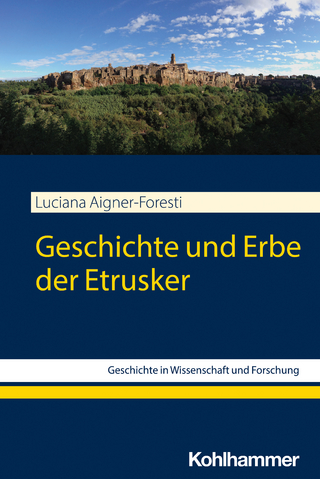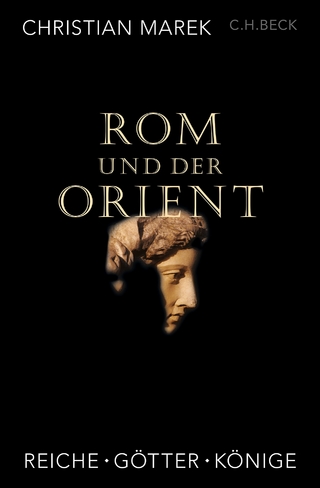
The War Cry in the Graeco-Roman World
Seiten
2022
Routledge (Verlag)
978-1-032-24858-5 (ISBN)
Routledge (Verlag)
978-1-032-24858-5 (ISBN)
This book aims to reconceptualise the Graeco-Roman military phenomenon of the ‘war cry’, replacing it with the more sophisticated term 'battle expression', which instilled group cohesion among participants and intimidated the enemy. Suitable for students and scholars of Classical Studies, particularly ancient warfare and military history.
This book aims to reconceptualise the Graeco-Roman military phenomenon of the "war cry"; the term itself is inadequate for defining an ancient military practice that has been misrepresented in modern media and understudied by contemporary scholars.
Gersbach introduces the term and paradigm "battle expression" to replace "war cry", which acknowledges the variety of undertakings, visual and sonic, that military forces from the Graeco-Roman world presented on the battlefield before, during or after battle. The "battle expression" was sophisticated in nature; it could include significant cultural song or dance that required high levels of rehearsal and execution. Conversely, battle expression types demonstrated spontaneous wit and humour on the part of a military force that aimed to capitalise on the experiences of a battle. These performances served a variety of purposes outside of instilling group cohesion among the participants and to intimidate the onlooking enemy. This book associates the psychological dimension of warfare, religious identity and military strategy supported by the High Command to this practice. In addition, the author draws comparisons with later historical periods, as well as the actions of modern-day European football supporters in stadiums, to reconstruct the atmosphere created by ancient military forces on the battlefield.
The War Cry in the Graeco-Roman World is suitable for students and scholars of Classical Studies, particularly those interested in ancient warfare and military history, as well as those studying the history of warfare more broadly.
This book aims to reconceptualise the Graeco-Roman military phenomenon of the "war cry"; the term itself is inadequate for defining an ancient military practice that has been misrepresented in modern media and understudied by contemporary scholars.
Gersbach introduces the term and paradigm "battle expression" to replace "war cry", which acknowledges the variety of undertakings, visual and sonic, that military forces from the Graeco-Roman world presented on the battlefield before, during or after battle. The "battle expression" was sophisticated in nature; it could include significant cultural song or dance that required high levels of rehearsal and execution. Conversely, battle expression types demonstrated spontaneous wit and humour on the part of a military force that aimed to capitalise on the experiences of a battle. These performances served a variety of purposes outside of instilling group cohesion among the participants and to intimidate the onlooking enemy. This book associates the psychological dimension of warfare, religious identity and military strategy supported by the High Command to this practice. In addition, the author draws comparisons with later historical periods, as well as the actions of modern-day European football supporters in stadiums, to reconstruct the atmosphere created by ancient military forces on the battlefield.
The War Cry in the Graeco-Roman World is suitable for students and scholars of Classical Studies, particularly those interested in ancient warfare and military history, as well as those studying the history of warfare more broadly.
James Gersbach is a PhD graduate from Macquarie University Sydney, Australia. He is the head teacher of the history department at a Secondary College in Sydney, Australia. This is his first major publication.
1. From war cry to the "battle expression"; 2. Graeco-Roman literary and archaeological sources; 3. Battlefield atmosphere; 4. Group cohesion; 5. Intimidating the enemy; 6. The religious dimension of battle in antiquity; 7. Socio-political and military identity; 8. Battlefield oaths; 9. Conclusion.
| Erscheinungsdatum | 06.12.2022 |
|---|---|
| Reihe/Serie | Routledge Monographs in Classical Studies |
| Verlagsort | London |
| Sprache | englisch |
| Maße | 156 x 234 mm |
| Gewicht | 367 g |
| Themenwelt | Geschichte ► Allgemeine Geschichte ► Altertum / Antike |
| Sozialwissenschaften ► Politik / Verwaltung | |
| ISBN-10 | 1-032-24858-0 / 1032248580 |
| ISBN-13 | 978-1-032-24858-5 / 9781032248585 |
| Zustand | Neuware |
| Informationen gemäß Produktsicherheitsverordnung (GPSR) | |
| Haben Sie eine Frage zum Produkt? |
Mehr entdecken
aus dem Bereich
aus dem Bereich


